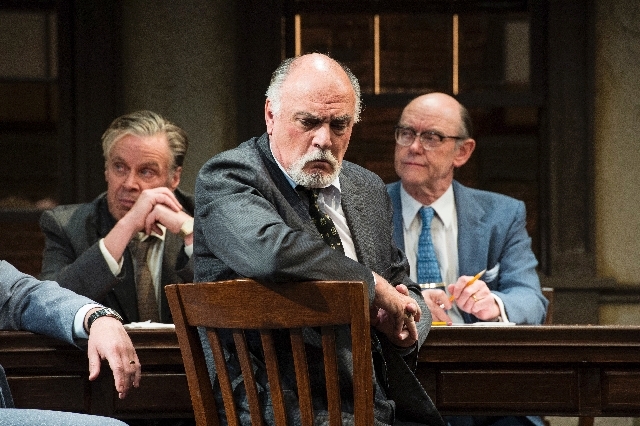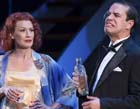Cast shines in ‘Twelve Angry Men’

Can’t we all just get along?
Long before Rodney King uttered that rhetorical question — and long before contemporary politicians answered a defiant “No!” — “Twelve Angry Men” pondered the crucial difference between getting along and going along.
That theme emerges with crackling energy in the Utah Shakespeare Festival’s production of “Twelve Angry Men.”
Reginald Rose’s jury-room drama began as an Emmy-winning drama during television’s 1950s Golden Age, then became a movie.
But the immediacy of the stage gives the drama a visceral impact that helps offset the play’s neat-and-tidy structure, with the “Twelve Angry Men” representing a cross section of 1957 America. (White male America, that is.)
From the dignified stockbroker (A. Bryan Humphrey) to the in-your-face salesman (James Newcomb), these “Twelve Angry Men” squabble, shout — and almost come to blows — as they debate the fate of a teenage slum dweller accused of murdering his abusive father.
Not that there’s much debate at first, with 11 jurors convinced of the defendant’s guilt.
But Juror No. 8 (Martin Kildare) maintains that anyone facing the death penalty deserves more than a let’s-get-it-over-with show of hands, forcing his fellow jurors to wrestle with their prejudices — and, in some cases, their inner demons — as they debate the evidence.
Director David Ivers maintains a brisk yet deliberate pace, using the play’s built-in claustrophobia to ratchet up the tension. (Jo Winiarski’s retro set, Jaymi Lee Smith’s lighting and Joe Payne’s sound designs augment the charged atmosphere.)
Ultimately, however, it’s up to the “Twelve Angry Men” themselves to make their case. And the veteran cast members acquit themselves honorably.
As embittered Juror No. 3, Max Robinson captures his character’s hostility — and the heartache behind it. Roderick Peeples, meanwhile, seethes as blustery Juror No. 10, railing against “those people” threatening America’s future. (The more things change …)
And Kildare (as he did in last season’s “To Kill a Mockingbird”) radiates quiet integrity without a trace of plaster sainthood, providing a still-timely reminder that one man can indeed make a difference. Especially when he’s demonstrating the courage of his convictions.
Contact reporter Carol Cling at ccling@
reviewjournal.com or 702-383-0272.
Review
“Twelve Angry Men”
52nd annual Utah Shakespeare Festival
In repertory through Aug. 31
Southern Utah University, Cedar City (2½ hours northeast of Las Vegas on Interstate 15)
$16-$74 (800-752-9849; www.bard.org)
Grade: B+
RELATED STORIES:

‘Peter and the Starcatcher’ captivates at Utah Shakespeare Festival

Song-and-dance numbers make ‘Anything Goes’ entertaining
 Actor brings emotional resonance to ‘The Tempest’
Actor brings emotional resonance to ‘The Tempest’




















